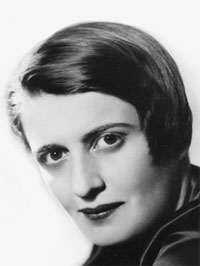 To create her unusual stories and characters, Rand had to define the new ideas and principles that guide her heroes. She had to create a new philosophy. “I am interested in philosophical principles,” she wrote, “only as they affect the actual existence of men; and in men, only as they reflect philosophical principles.”
To create her unusual stories and characters, Rand had to define the new ideas and principles that guide her heroes. She had to create a new philosophy. “I am interested in philosophical principles,” she wrote, “only as they affect the actual existence of men; and in men, only as they reflect philosophical principles.”
For Rand, philosophy is not an esoteric subject but a daily force shaping individual lives and human history. You must have some view of the kind of world you live in, of how best to understand and deal with it, and of what to aim at in life. Your only choice is whether your philosophical premises are acquired by your own independent thinking or absorbed unquestioningly from those around you.
Formally, Rand called her philosophy “Objectivism,” but informally she called it “a philosophy for living on earth.”
- America’s Persecuted Minority: Big Business - Ayn RandIn this lecture and associated Q&A session, Ayn Rand discusses how business, big business especially, is the one minority in America that no one care to defend. As she says at the beginning of the lecture, given in 1961:
The defense of minority rights is acclaimed today virtually by everyone, as a moral principle of a high order. But this principle, which forbids discrimination, is applied by most of the "liberal" intellectuals in a discriminatory manner: it is applied only to racial or religious minorities. It is not applied to that small, exploited, denounced, defenseless minority which consists of businessmen.
Anthem - Ayn RandIn a world where science and learning are banned and the simple utterance of the Unspeakable Word, I, is punishable by death, a man named Equality 7-2521 struggles with his unquenchable desire to investigate, to think, to know. His instincts are a “curse” that threatens to bring him to the attention of a government dedicated to the elimination of the self. But Equality 7-2521 cannot ignore his true nature, just as he cannot ignore the fruits of his curiosity: the discovery of the mysterious “power of the sky.” His great awakening—in heart, mind, and soul—represents the inevitable triumph of the individual over the collective.This short book is a great introduction to what would go on to become Objectivism.Atlas Shrugged - Ayn RandProbably Ayn Rand’s best known novel, it represents a fuller exploration of her philosophy. While, as with The Fountainhead, it relates her philosophy at the individual level, it also explores the ramifications of philosophy at a societal level as well.Capitalism: The Unknown Ideal - Ayn RandAnother non-fiction collection of essays this time about capitalism. Essays were written by Ayn Rand, Nathaniel Branden, Alan Greenspan.The Fountainhead - Ayn RandI have seen this described, though I forget where, as a somewhat personal application of her philosophy. Or rather her philosophy expressed at a very personal level.The Return of the Primitive: The Anti-Industrial Revolution - Ayn RandIn the tumultuous late 60s and early 70s, a social movement known as the "New Left" emerged as a major cultural influence, especially on the youth of America. It was a movement that embraced "flower-power" and psychedelic "consciousness-expansion," that lionized Ho Chi Minh and Fidel Castro and launched the Black Panthers and the Theater of the Absurd.
In Return Of The Primitive (originally published in 1971 as The New Left), Ayn Rand, bestselling novelist and originator of the theory of Objectivism, identified the intellectual roots of this movement. She urged people to repudiate its mindless nihilism and to uphold, instead, a philosophy of reason, individualism, capitalism, and technological progress.
Editor Peter Schwartz, in this new, expanded version of The New Left, has reorganized Rand's essays and added some of his own in order to underscore the continuing relevance of her analysis of that period. He examines such current ideologies as feminism, environmentalism and multiculturalism and argues that the same primitive, tribalist, "anti-industrial" mentality which animated the New Left a generation ago is shaping society today.The Virtue of Selfishness - Ayn RandThis is one of Ayn Rand’s non-fiction books and is a collection of essays by Ayn Rand and Nathaniel Branden on the nature of selfishness or rational self-interest.%d bloggers like this:
